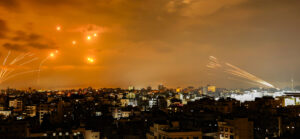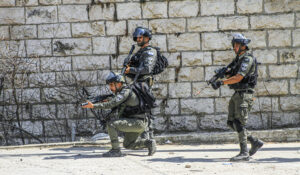“Love your enemies,” a holy Jew said, a long time ago. But I am not sure I am quite ready for that. Not today at least. I am neither Jewish nor Israeli, but my wife is both, as are my two small boys. They all have Israeli citizenship. And explaining to my little ones what is happening over in their other home has felt so important, and yet completely impossible.
Why is granny hiding in a bomb shelter? Why do they want to murder people like us? I want to protect them from all of this and just let them play with their Pokémon cards. But children have an instinctive knowledge that something is not right. And their questions keep on piling up. For today, my love is reserved for creating a loving bubble around my family. Making tea, piano practice, keeping the house tidy, sharing cuddles. I don’t even like them leaving the house at the moment.
I tried to say a few words about what is happening in Israel at church on Sunday. I thought I would be ok to just ask people for their prayers. I speak in front of my parishioners all the time. But I underestimated the distress I was suppressing. I had, foolishly, spent too long scrolling through social media in search of information. And so I have seen things that cannot be unseen. The fear in the eyes of those who have been taken, the wild hatred of those parading the semi-naked bodies of murdered young people, their twisted limbs. When I stood up to speak, the words wouldn’t come. The simple mechanics of speech abandoned me. Only dumb tears.
And for today at least, I have no time for those who want to “both sides” the situation. This was a massacre, hideously reminiscent of the Shoah. They beheaded children. I do not want to hear those whose first sentence expresses condolences, and whose second sentence begins with a “But”. Nor do I want to hear your little pet theories about the politics of the Middle East, not when the world outside feels such a threatening place for my family. As Amos Oz explained in his excellent book, How to Cure a Fanatic, Arabs and Jews typically understand each other far better than we Europeans understand either of them. Cost-free wisdom from Western liberals is so often pathetically ill-informed and bathing in self-righteousness. Look at those riding their cars up and down the Edgware Road, beeping their horns in delight, Palestinians flags flying from their windows. And those B-list academics who preach decolonisation and celebrate the slaughter of innocents as some sort of noble justifiable resistance. Little wonder London’s Jewish Free School has just made the wearing of their school blazer optional for students on the way to and from school. Those who have created a culture where all this is deemed acceptable have lost any sort of contact with moral reality.
I’m not sure I have even got properly angry yet, though this will inevitably follow. Not just anger, but blazing fury. Then I will have to reckon with those impossible words: “Love your enemy.” Then I will need most to remind myself of the humanity of those who want to do my children harm. Yes, that they have children too. And that their children are now under the most enormous threat.
It was 19 years ago last week, that I first visited Gaza. We went to a primary school in Khan Yunis, right at the southern end of the Gaza Strip. Before lessons, the children had to throw balls at the wall to expend all their frustration. Without that, they were unable to concentrate on their lessons. As the children were showing me where their houses used to be, houses which had been demolished by Israeli bulldozers, a machine gun from the border emptied its load in our direction. Bullets kicked up dust all around us. Children of seven and eight — the same age as my boy — ran behind a wall like they’d done it before.
I remember we played football and ate ice cream. And I tried to recall some of their faces and I will need to think of them when my own anger wells up within me. They would be in their late 20s now, of course. It was a disturbing thought, inviting a depressing conjecture: perhaps some of them were now in Hamas; perhaps some broke through the border on Saturday, going house to house, murdering Israelis. Or perhaps some of them never made it to adulthood.
The situation is, of course, now going to get so much worse. And so, not only do I find “love your enemies” hard to conjure, but I find hope even harder. I’m not much of a Christian, I know. Surely a ground war is coming, with soldiers venturing into the most dangerous of places to try and rescue terrified captives who are now tied up in cellars, subject to the Isis-like cruelty of their captors. There will be those who will inevitably cast this response as revenge. But retrieving prisoners from the depths of such a desperate evil is the only thing that the Israeli army can possibly do. Those who try to draw some sort of moral equivalence between a rescue mission and the deliberate and gleeful murder of the innocent have totally lost their moral bearings. They have become the useful idiots of rapists and murderers. So for now, the only words of hope I have to stand alongside are those from the Israeli National Anthem, Hatikvah. “Our hope is not yet lost. It is 2,000 years old. To be a people free in our land.”
I pray that captives will be found and released — prayers being the only thing available to some of us. What good will they do, asks the sceptic? Even that question misunderstands how prayer works. Prayer is my category for the most important of things that I cannot and do not know how to solve. Like tears, it is a bubbling up of something impossible to silence. It’s not a way of getting something done in the world; I’m not escalating stuff to the almighty. And anyway, He and I are going to have words when this is over. I have more than a few questions — and in the silence of my prayers, they won’t be gently put. But neither can I get through all of this without Him.
Disclaimer
Some of the posts we share are controversial and we do not necessarily agree with them in the whole extend. Sometimes we agree with the content or part of it but we do not agree with the narration or language. Nevertheless we find them somehow interesting, valuable and/or informative or we share them, because we strongly believe in freedom of speech, free press and journalism. We strongly encourage you to have a critical approach to all the content, do your own research and analysis to build your own opinion.
We would be glad to have your feedback.
Source: UnHerd Read the original article here: https://unherd.com/




